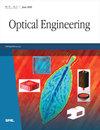Research on the fabrication of high-power semiconductor lasers by impurity-free vacancy disordering
IF 1.2
4区 工程技术
Q4 OPTICS
引用次数: 0
Abstract
The preparation of a non-absorption window (NAW) through impurity-free vacancy disordering (IFVD) induced quantum well intermixing (QWI) in 915 nm GaInAsP/GaAsP semiconductor lasers is aimed at enhancing the catastrophic optical mirror damage (COMD) threshold and output power of semiconductor lasers. A process for the fabrication of high-power semiconductor lasers has been explored through the intermixing study of primary epitaxial wafers. In the experimental procedure, the epitaxial layers at the front and rear facets were first selectively etched, followed by the deposition of a 200 nm SiO2 dielectric layer on their surfaces. Additionally, a 100 nm TiO2 dielectric layer is applied to suppress QWI in the gain emission region. A NAW is achieved through a rapid thermal annealing process at 830°C for 180 s under atmospheric pressure. In the wafer-scale fabrication process, wide-stripe single-tube devices are produced with a light-emitting region width of 200 μm and a cavity length of 4000 μm. Test results reveal that conventional single-tube devices typically experience COMD at an input current of ∼20 A, with power output at around 19 W. In contrast, the single-tube devices with the NAW reach a continuous output power of 27.7 W at an input current of 30 A, representing a power enhancement of ∼45.8 % . No optical catastrophic damage is observed, and characteristics, such as slope efficiency and threshold current, remain unaltered. This research demonstrates that IFVD combined with the wafer-scale fabrication can effectively enhance the COMD threshold of 915 nm GaInAsP/GaAsP semiconductor laser devices, offering valuable insights into the study of high-power semiconductor lasers.无杂质空位无序制备大功率半导体激光器的研究
利用无杂质空位无序(IFVD)诱导量子阱混合(QWI)在915 nm GaInAsP/GaAsP半导体激光器中制备非吸收窗口(NAW),旨在提高半导体激光器的灾难性光学反射镜损伤(COMD)阈值和输出功率。通过对初级外延片的混合研究,探索了高功率半导体激光器的制备工艺。在实验过程中,首先选择性地蚀刻前后表面的外延层,然后在其表面沉积200 nm的SiO2介电层。另外,在增益发射区添加100 nm TiO2介质层抑制QWI。NAW是通过在830°C和大气压下180 s的快速热退火过程实现的。在晶圆级制造工艺中,可以生产出发光区宽度为200 μm、腔长为4000 μm的宽条纹单管器件。测试结果表明,传统的单管器件通常在输入电流为~ 20 A,输出功率约为19 W时经历COMD。相比之下,具有NAW的单管器件在输入电流为30 a时达到27.7 W的连续输出功率,功率增强了约45.8%。没有观察到光学灾难性损伤,并且诸如斜率效率和阈值电流等特性保持不变。本研究表明,IFVD结合晶圆级制造可以有效提高915 nm GaInAsP/GaAsP半导体激光器器件的COMD阈值,为高功率半导体激光器的研究提供了有价值的见解。
本文章由计算机程序翻译,如有差异,请以英文原文为准。
求助全文
约1分钟内获得全文
求助全文
来源期刊

Optical Engineering
工程技术-光学
CiteScore
2.70
自引率
7.70%
发文量
393
审稿时长
2.6 months
期刊介绍:
Optical Engineering publishes peer-reviewed papers reporting on research and development in optical science and engineering and the practical applications of known optical science, engineering, and technology.
 求助内容:
求助内容: 应助结果提醒方式:
应助结果提醒方式:


